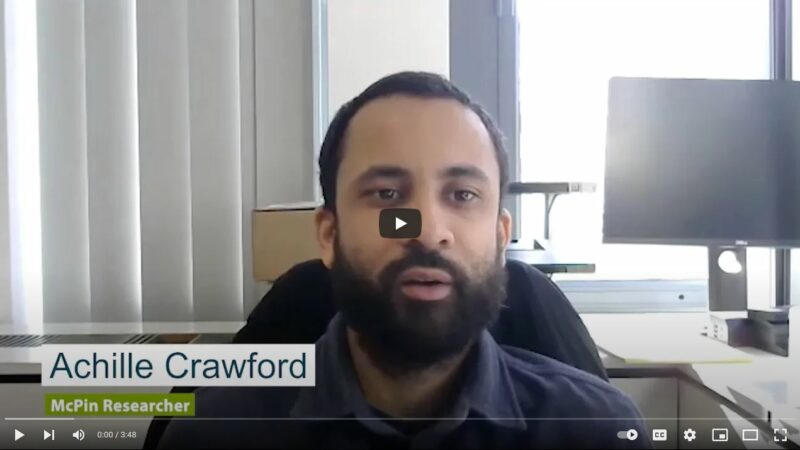In the final blog for our Black Thrive evaluation, peer researcher Faith Amasowomwan is interviewed by Dr Kathryn Watson.
McPin and The Social Innovation Partnership (TSIP) are currently working with Black Thrive on the Black Thrive Employment Project.
The primary focus of this project is to improve employment outcomes for Black people with long-term physical and mental health conditions in Lambeth. This includes working to ensure that Black people in Lambeth with long-term conditions are no less likely to be in employment than anyone else, including their White counterparts.
The project takes a community-led approach, collaborating with statutory bodies and local organisations to achieve justice by making changes to local systems, such as healthcare, education, employment and local government.
Hello Faith! What is your role in the Black Thrive Employment Project?
I’m a lived experience researcher at McPin and I’ve been working on the Black Thrive Employment Project, which is led by McPin.
It’s been an interesting journey for me for many reasons, one of which is because I wear two hats: I am both a member of the project Working Group and also an evaluator working on the Developmental Evaluation.
The Working Group consists of the Black Thrive Employment project co-ordinators, community and peer researchers, members of the community and other key stakeholders.
Together, we use our lived experience, community expertise and systems knowledge to distribute grant funds to smaller projects within the community, which could improve employment outcomes for Black people with long term health conditions.
The Developmental Evaluation involves looking at how the project is being carried out. The aim is to enable the project to proactively address any challenges as they arise, as well as place additional resource and focus into things that are proving successful.
For example, through collecting survey data, we discovered that some members found it difficult to interject in online meetings and therefore couldn’t get their point across.
We fed this back and as a group, decided to make changes to the facilitation style, placing more emphasis on the chat and ‘raise hand’ features on Zoom, the videoconferencing software program.
When people are so closely connected with a project, it can be especially uncomfortable for them to have an ‘outsider’ come in to observe and infiltrate their space.
What benefits does your dual role bring?
Everyone involved in the Black Thrive Employment Project has personal experience or connection with the project topics, so it is an incredibly intimate space.
Often, when people are so closely connected with a project, it can be especially uncomfortable for them to have an ‘outsider’ come in to observe and infiltrate their space. In a way, this is what the Developmental Evaluation team does. They sit ‘outside’ the project team and are required to evaluate how the project team is working.
However, because I sit in both the Developmental Evaluation team and the project team, I can sometimes be seen as less of an ‘outsider’ and more of a peer. This helps me to build rapport with other project team members.
In some cases, for example during interviews we carried out with the project team as part of the Developmental Evaluation, this can help put people at ease, so that they feel more comfortable speaking honestly.
Gaining more in-depth information from people enables us to make more relevant and meaningful assessments and recommendations, as part of our evaluation feedback to the project team.
In addition, I feel that my dual role gives me an important and unique perspective on the project. It helps me understand where everybody is coming from, which can provide me with valuable insights.
Does occupying this dual space bring any challenges?
Sometimes, trying to communicate certain messages to the project team when I’m in my evaluator role can be frustrating. No matter how many times I try to clarify my position, other members may perceive what I say as my opinion, and not as facts derived from the evaluation. However, it’s understandable that my dual role can be confusing to people at times.
My dual role can also make it hard for me to navigate conflict that can arise between the project and evaluation teams. This is because I feel that my ‘allegiances’ are tied to both teams. However, these experiences have taught me a lot about how to manage conflict. Over time, I’ve enjoyed learning how to navigate these situations better and building up my skills.
Some members of the project team may be uncomfortable giving their honest opinions to someone that is heavily involved in the project itself. What if they wanted to say something negative about me?
Does your dual role effect other people in the project?
We were very aware that my dual role on the project could impact other people. For example, some members of the project team may be uncomfortable giving their honest opinions to someone that is heavily involved in the project itself. What if they wanted to say something negative about me? They should have the space to do so.
To help mitigate this, there are other members of the evaluation team that do not simultaneously occupy a role within the project team, and we offer everyone the choice of who they would like to speak to. People can also request that their data is not seen by other team members, including me.
What will you take away from your experiences?
Although occupying this dual space has its challenges, I wouldn’t exchange my place. I get to experience the changes being made throughout the process.
Looking at the bigger picture, the changes that come with the evaluation are being made by the people for the people. On an individual level we could also say the changes are being made by me, for me.
I feel completely immersed in the process and it only fuels my passion for and connection with the project.
It’s not often you get to be so immersed in a project and navigating it all has definitely been a highlight of my research to date.
As such, I would advise all researchers to consider having someone with a dual role on their project, as it can provide a new dimension of insight – something that is not possible unless you cross the boundary between two spaces.
Faith Amasowomwan is a Peer Researcher and Patient & Public Involvement Officer at McPin. She worked on the Black Thrive Employment Project as an Evaluator and member of the Working Group.
This is the last of three blogs in a series about the Black Thrive Employment project – you can see the other two below.
To read more about this research, please visit the project page here.



